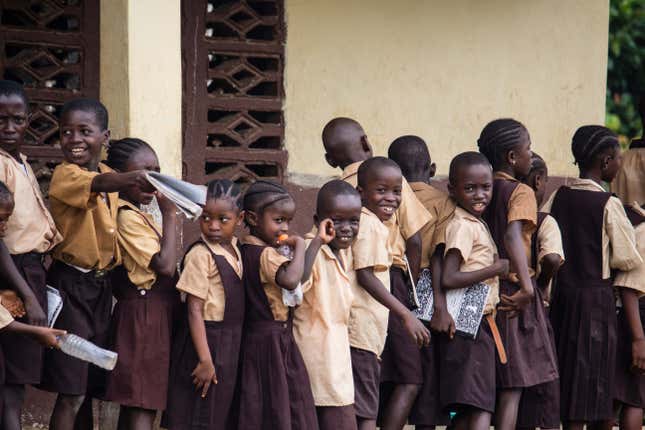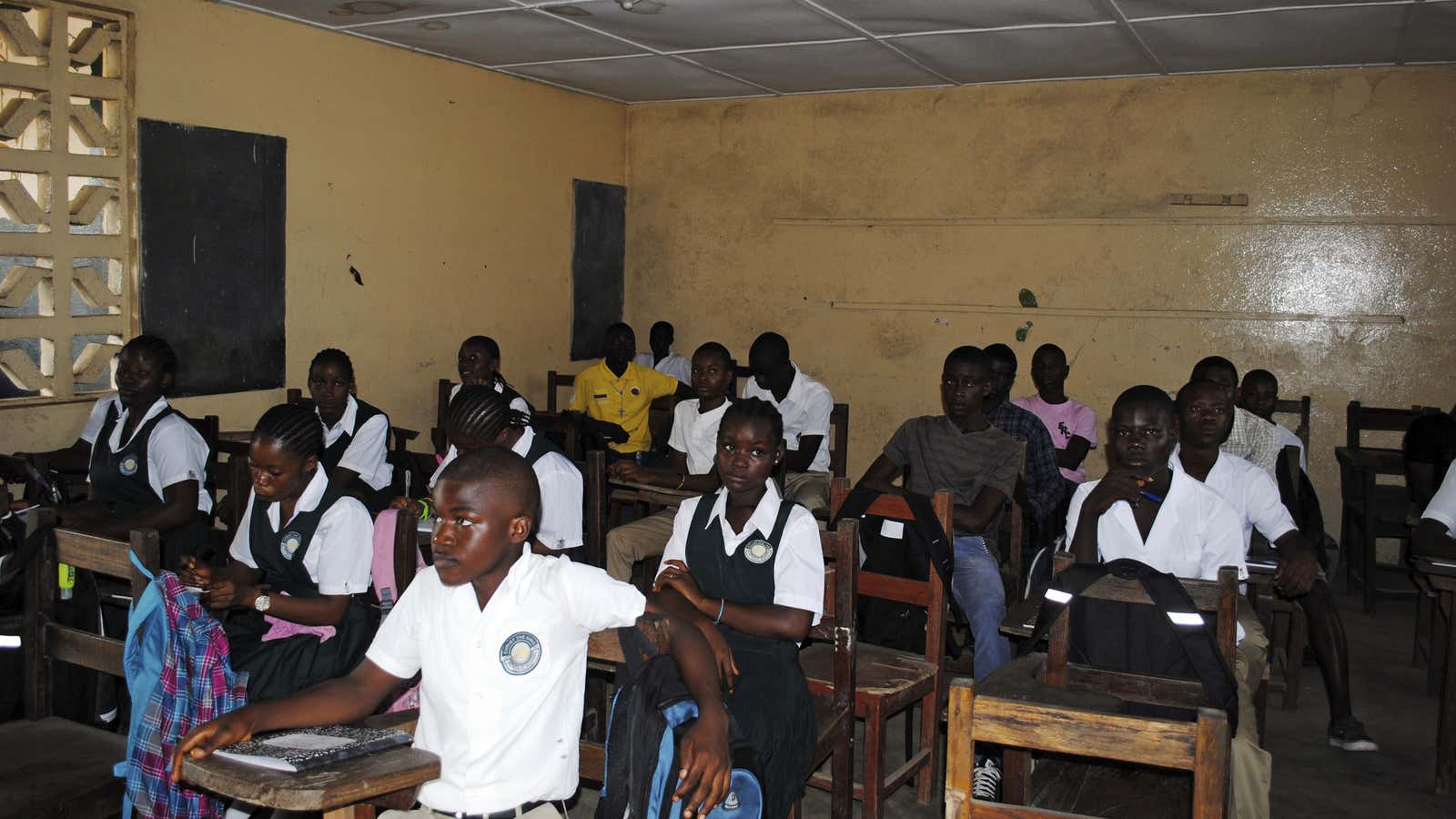Liberia’s education system is in crisis.
Our communities are still suffering from the effects of the long civil war and the devastating Ebola outbreak. Less than 60% of school-aged children in Liberia are in school, placing Liberia in the lowest percentile of net enrollment rates in the world. Those who do attend school may not fare much better: among adult women who reached fifth grade in Liberia, less than 20% can read a single sentence. Teachers, particularly those in remote areas where there are no banks, sometimes don’t receive their salaries on time and therefore often don’t show up. And it is our children, the future of our nation, who are suffering most.
To not act now would be to fail yet another generation of Liberia’s children.
President Ellen Johnson Sirleaf knows that fixing the education system is a top priority for our country. So, when she appointed me as education minister at the start of 2015, she challenged me to be bold. She asked me to look for innovative education policy options that have the potential to strengthen the public education system in an enduring and sustainable manner. This government is not here to deliver empty promises: our duty is to ensure every child receives a quality education, an education that gives them real chances and choices in life.
My country defeated Ebola with strong political leadership, community engagement, proven good practice and a surge in support from our international partners. To tackle the education crisis, I knew I had to similarly bring together these ingredients, Liberia’s unique assets, in a progressive coalition to improve our schools.
Fact-checking
Any bold policy reform will always be controversial and will attract scrutiny. This was no exception. 12 months ago, I announced Partnership Schools for Liberia and it quickly became a media sensation, with a flurry of coverage in the Liberian and global media. Unfortunately, at the time, and until now, the facts have rarely been reported correctly and ideology has driven the debate.
But with hundreds of thousands of Liberian children enrolled in failing government schools, denied the quality education they deserve, now is not the time to be ideological. Now is the time to be bold, to pilot and experiment and, of course, to rigorously evaluate those pilots before scaling.
The 94-pilot school remain public schools, regulated and quality assured by the government. PSL teachers are civil servants on government payroll, and have every right to be members of teacher associations—Liberian teacher unions. The school buildings remain the property of the government of Liberia. PSL is not privatizing Liberia’s primary schools.
Eight Liberian and international school operators were carefully selected to manage the pilot schools through a ministry-led open and competitive bidding process. Between them they bring education experience from Liberia, West Africa, the wider African region and beyond. These include organizations like BRAC, with vast experience running schools and education programs in Africa and South Asia; Bridge International Academies, which operates more than 400 schools in Kenya, Uganda, Nigeria and India; and Rising Academies, which runs eight schools in neighboring Sierra Leone.

These are organizations that see great value collaborating with the government to deliver better educational outcomes for our children. Any decision to scale or terminate individual PSL operators will be made by the ministry team, based on independent evidence and community feedback. Most importantly, no single organization is or will be getting monopoly rights over Liberia’s primary schools.
Price points
The Ministry of Education has exactly the same financial obligation to the 94 pilot schools as any other public school—around $50 per child per year. PSL operators receive an additional philanthropically-funded subsidy of $50 per child, which enables them to build up the teams, curricula, data systems, among other things they need to run excellent schools.
Ultimately, we expect all operators to run their schools at the government price point, but we know that takes time. We are fortunate to have a group of philanthropic partners who are willing to take on this financial risk in support of the government. At my request, PSL is being rigorously evaluated by a world class research team to provide an independent measure of the effectiveness, equity and sustainability of PSL. The research team works hand-in-hand with the Ministry of Education so we get the data we need to make sensible policy decisions about the future of PSL.
The evaluation is analyzing the impact of PSL across several dimensions, including enrolment, attendance, learning outcomes, equity and parent perception and community engagement. It is a randomized control trial, which will help ensure that differences between PSL and non-PSL schools reflect the true impact of the program rather than any pre-existing differences between the schools. I have been clear from the start that any significant scale up of PSL will be dependent on the results of this evaluation.
This is just one component of Liberia’s progressive education reform platform
PSL is an important but by no means the only priority for the Ministry of Education. There is no magic bullet to fix education in Liberia or anywhere, and PSL is just one of a range of reforms we are undertaking to improve our education system. These include plans to reach out-of-school children; the deepening and strengthening of school accountability mechanisms; and an aggressive payroll cleansing program which has already achieved $1.7 million annual savings, no token amount given that my total basic education budget is just $41 million per year.
Within PSL, my task as the education minister is to make sure that the school operators are provided with the conditions they need to deliver, while holding them accountable for their performance. They are required to report regularly on pre-agreed metrics, and their schools are inspected by my team for aspects including child-safe-guarding and quality of teaching and learning.
The public side of a public-private partnership is just as important as the private side. My team is building up the capacity we need to truly be the duty bearer for education: with responsibility for all decisions to commission, scale and indeed terminate operator contracts.
Signs so far are promising. Almost 28,000 children are enrolled in PSL schools, taught by re-invigorated and re-trained government teachers, supported by energized parents and resilient communities. They have the full backing of the Ministry of Education and I am proud of what has been achieved so far.
But these are early days for PSL. While I believe it holds great potential, my team and I are clear that the program will not be scaled significantly until the data shows it works and we have the capacity within government to manage it effectively.
Please challenge and scrutinize the program. We welcome that. But don’t judge PSL on ideological grounds. Judge us on the data—data on whether PSL schools deliver better learning outcomes for children.
The future of hundreds of thousands of Liberian children, their communities and our nation is at stake. We must not fail them.
